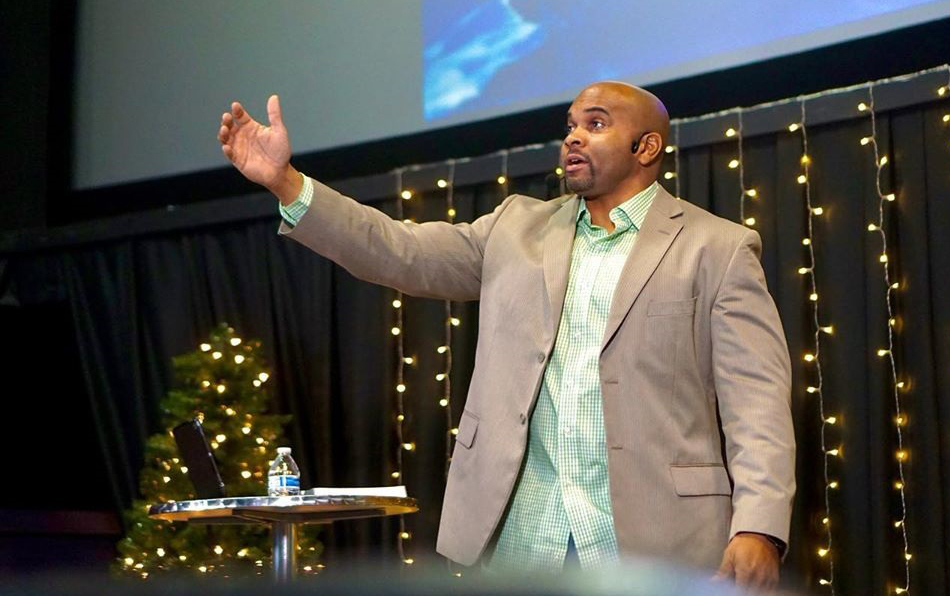 [1]
[1]LOUISVILLE, Ky. (BP)–“I can see clearly now …” the early ’70s hit by singer Johnny Nash began.
The optimistic Nash went on to sing about how no obstacles (whatever that means!) were now in his way and how the dark clouds once blinding him had all but vanished. Even his bad feelings, it seems, had somehow disappeared.
“It’s gonna be a bright, bright sunshiny day,” Nash sang — which seems to be an apt tune for NASA too, now that the four-story Hubble Space Telescope (HST) has received its pricey techno-makeover, one that will improve its overall performance and extend its usefulness as a research instrument for years to come, at least until 2010. Great news for the scientific powers-that-be, and to some extent the rest of us as well!
Imagine taking a poll asking everyday folks if they’d like to be endowed with the ability to see 10 times better than they can now. Any sane person, abnormally sighted or not, would jump at the chance, perhaps even coveting such a gift.
NASA scientists are telling us that if everything proceeds according to plan, that’s exactly what the HST will soon be able to do (see every glistening star cluster and cosmic megastructure out to the farthest nether-regions better by one power of 10!). “Hello, Mr. Hubble, … we’re here to give you more power to see the planets, stars and the universe,” said astronaut John Grunsfeld as repairs and new installation got underway in early March.
As important as scientific advance is, however, a somewhat rhetorical question quickly comes to mind: Does this mean we now have more power at our disposal to perchance see God? We all realize upfront, of course, that the stock-in-trade answer to such a question is no, but there’s nevertheless a sense in which we can respond to such a query, to such a revelatory scenario, with a resounding, “Yes!”
To make a purposeful entree into theology at this point, Hubble’s newest set of cosmic eyes will always be inferior to the penetrating gaze of a Creator-God by countless orders of magnitude. But we’re obviously speaking on two different levels here. At the level of special revelation, God’s “eyes” (anthropomorpically speaking) have already looked down through the corridors of time upon our sinfulness as human beings, seen our desperate need for salvation and revealed our spiritual condition to us through his Word, whether read, spoken, taught or preached. And so our response to God’s offer of salvation in Christ is, of course, made effective only by the kind of grace through faith that proves itself sufficient to save.
On the other hand, at the level of general revelation, the apostle Paul informs us in Romans 1:18-20 and 2:14-15 that our very sensory participation in the created order (the “starry heavens above,” it’s been called) is sufficient in itself to condemn us, to separate us eternally from God if we should continue to reject this intrinsic divine manifest at the levels of, first, God’s “invisible attributes” and, second, the contemplation of “what has been made.” And when these are distinguished in league with the “moral law within,” we are categorically “without excuse” regarding the questions of God’s existence and his authority over us.
So it’s by no means straying too far from the biblical path to say that when Hubble’s new eyes begin sharpening our view of the cosmos incrementally 10 times over, then there’s at least a semi-proportional increase in human accountability before God at work as well.
No one’s asking, on the one hand, for a corresponding tenfold increase in every sinner’s guilt before God simply on the basis of Hubble’s upgrade in technology. On the other hand, we can posit with confidence that this particular generation of global humanity is privy to a disclosure of God’s power, intelligence and creativity on a cosmically grand scale as none before it. Even a single cursory glance at the awe-inspiring image of what’s now called the Eagle Nebula, taken years ago, demonstrates this clearly. So who can possibly guess what might be “revealed” next through the new eyes of Hubble? Surely there’s more unimaginable beauty to come, available to anyone who wishes to check out the data soon to be received.
How much more, then, today can we confer a 21st-century sanction upon the psalmist’s 10th-century B.C. insight: “When I consider Your heavens, the work of Your fingers, the moon and the stars, which You have ordained; what is man that you take thought of him, and the son of man that You care for him?” For the sake of his glory, the Creator seemingly takes delight in what he has made and then showing it to us afterward piece by astronomical piece.
Whatever the HST’s latest viewfinders unveil for us will in the end lend greater weight to the stream of thought known as “classical apologetics.” Since defending the faith as a discipline is inextricably bound up with theories of knowledge, a solid starting point for such interests is this: Every aspect of true knowledge is divinely revealed at some level.
With this as perhaps the best working assumption available to us and as an alternate way to express the venerated maxim that “All truth is God’s truth,” we still need to remind ourselves that whatever overall interpretation of Scripture should come along on the theological front (for example, the systematized conclusions of open theism) can as quickly and tragically go awry as whatever particular interpretation of nature comes along on the scientific front (for example, evolutionary theory). In other words, there are as many poor and dead-wrong interpretations of various biblical doctrines out there (espoused by genuine Christians even!) as there are, say, atheistically tinged theories about the origin of the universe being circulated by rank unbelievers with some dismissive religious axe to grind.
If we’re honest with ourselves, then, when we presuppose Scripture as the only source for truth about God, as some in the “presuppositional” school of apologetics have historically been prone to do, it doesn’t really guarantee any one Christian individual the advantage, especially with regard to always getting the facts right or arriving at the bottom-line truthfulness of a given matter. So to whatever degree sin actually hinders the human mind’s ability to arrive at truth, it’s statistically sound to conclude that sin can have an equally detrimental effect upon the Christian’s ability to interpret Scripture correctly as it can upon the unbeliever’s ability to interpret the natural world aright.
Accepting this places the classical and presuppositional schools of apologetics on at least equal footing with respect to knowledge, its everyday use and the arguments for God’s existence derived from either the Bible or nature. The presuppositionalist’s assumed advantage is almost phantom-like in its idealism, however, whereas classical apologetics interacts with the external world realistically as it openly seeks to turn God’s epistemological diary page by page, with the dual keys of divinely bestowed reason and sense perception unlocking its cosmic meaning at God’s behest. And so the story just keeps getting better and better now that the Hubble Space Telescope is “born again” and ready to reveal God’s handiwork in ways both enriching and perhaps even unfathomable.
And, to pay a short visit to the philosophical realm, God in his faithfulness crafted spacetime reality both to be and to behave in certain ways. Hence, human beings are graciously enabled to access this reality through our thinking and our senses in ways that prove basically reliable, even with all our imago dei-like features categorically affected by sin. Such a starting point doesn’t strain any of our biblical assumptions about acquiring knowledge in the least regarding how we go about ascertaining facts surrounding either God or the world, all the misguided talk about the inadequacy of general revelation notwithstanding.
To flesh out this needed consideration, this “realist epistemology,” if you will, requires only a modicum of biblical backing. Psalm 19:1-2 states: “The heavens are telling the glory of God; and their expanse is declaring the work of His hands. Day to day pours forth speech, and night to night reveals knowledge.” To make a long story short, God’s general revelation always tells the truth when it comes to things created, just as the Bible does.
So when the Hubble Space Telescope uncovers the fact that 80 some odd planets (and counting!) are encircling suns other than our own, or that once theoretical black holes are now detectable cosmos-wide, or that the age of the universe appears to be far greater than what some groups dogmatically assert, we can do one of two things. Either we can trust our observations (like most of us do when walking safely across the road without getting smashed by some fast approaching vehicle!) or we can disavow the sufficiency and truthfulness of what God has allowed us to perceive, of what reality confronts us with, for the sake of merely upholding our already staunchly held beliefs about things we prefer the Bible to say (so that we won’t be found wrong!) as opposed to what it might actually be saying.
We don’t need any more “flat earth” or “the earth is the center of the universe” reduxs! Again, God’s creation and the Scriptures each speak the truth. The trick these days is coming up with a workable harmony between the two, one in which a theistic realism of sorts will be sufficiently achieved, hopefully by way of consensus.
Perhaps upcoming HST “revelations,” imminent as they are, will assist us even more in the days ahead to understand how God’s general and special “books” of revelation are meant to relate, how they illustrate for us various truths ranging from reality’s particulars, cosmic or otherwise, to God as uncaused, and how they operate with equal authority at their divinely specified levels.
To wrap up on a more devotional note, the Hubble Space Telescope’s now pristine eyes will permit us to see God’s creative acts more clearly now, and so to a greater extent his “invisible attributes” as well.
In some sense seeing truth clearly is the ultimate goal we need to achieve as stewards of the mysteries of God, whether of the general or special variety. In turn, seeing truth clearly ourselves as God’s ministers (with every Christian as a minister!) will help insure that other folks also see God more clearly, at least insofar as he allows us to keep on fulfilling the cultural mandate to subdue the earth and, of course, the call to preach and teach the gospel in order to disciple the nations.
One proviso, however (whether on natural or spiritual planes): We still see through a glass darkly, due as much to our finitude as to our sinfulness. Taking advantage of a little lyrical license, then, and with apologies to Johnny Nash, as Christians we could baptize his lyrics to sing, “I can see clearly now, the sin is gone….” and be 100 percent correct about it, but the “darkly” part will always be with us on this side of the grave.
Thanks be to the Lord, however, that Jesus Christ as the Logos of creation and redemption mediates God’s truths to us in ways both general and special, allowing us to pursue knowledge gains from both revelations together and thereby providing us with the ultimate sanction for saving souls.
–30–
Ostrander is associate dean and associate professor of Christian theology at Boyce College, the undergraduate school of Southern Baptist Theological Seminary, Louisville, Kentucky.





